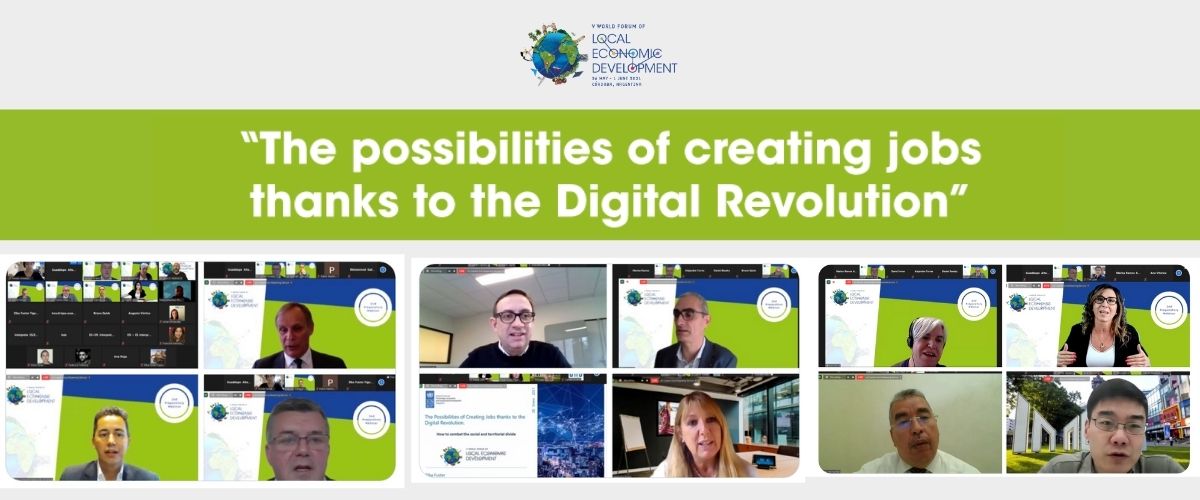Second webinar on how to create jobs in the digital sphere

On January 28th, as part of the preparations for the V World Forum on Local Economic Development, which will be organized in Cordoba, Argentina in May 2021, a webinar was held entitled "Opportunities for job creation through the digital revolution". ORU Fogar was able to coordinate this seminar as it had already dealt with the topic during its annual meeting at the end of 2020 when the Digital Campus of the region Auvergne-Rhône-Alpes was presented. On this occasion, a university for 5,000 students was presented focusing on digital training. This is the region's major commitment for the near future with the aim of making Lyon the leading digital center in Europe.
The new webinar was based on data provided by the International Labour Organization: by the end of August 2020, 495 million jobs had been lost worldwide due to COVID-19. Faced with this situation, experts, including Jeremy Riffkin, the author of "The End of Work", pointed out that in the immediate term, there are two major areas where jobs can be created: digitization and energy transition. The webinar addressed the first of these two topics.
The representative from Auvergne-Rhône-Alpes was not alone in stressing the importance of training young people for the digital revolution. In the wide sense, many speakers stressed that education must be job-oriented with academic content but also dual (practice, theory and coaching). At the opening of the event, Manuel Fernando Calvo, Vice-Governor of Cordoba, spoke of the importance of education, inclusion, access to technology and support for entrepreneurs as keys to the future. A statement illustrated by Laura Jure, Minister of Employment Promotion and Family Economy of the Provincial Government of Cordoba, when she talked about their vocational training program. As she explained, the program combines training and work practice for 12 months, increases skills, integrates youth and pursues the mobility of human capital. The destiny of young people is to stay in the companies where they did their internship, to turn to other companies or to start their own projects.
Several speakers also noted the importance of ensuring that small and medium enterprises are integrated into digital platforms to generate benefits for local economies. Daniel Baudry, director of the Digital League Cluster of Auvergne-Rhône-Alpes, explained how, during the pandemic, digital companies were able to help companies in other sectors to find innovative solutions. Tim Luan, director of Innoway, the Beijing innovation agency, began his speech by strongly asserting that the possibilities of creating businesses through digital platforms are endless. He explained how China is getting ready: 5G stations and data centers are being created to lay the foundation for work.
Some also strongly asserted that public administrations should start working in their own sphere. Alejandra Torres, Secretary of Planning, Modernization and International Relations of Cordoba, explained that her municipality had chosen to eliminate postal mail. The digital bet was also to rationalize the administrative process. By revising the procedures, they were able to reduce the long and tortuous processes, replace them with simpler ones, and move to shorter deadlines. In this way, Cordoba is paving the way to become a digital city with processes that do not hinder activity generation projects, but rather facilitate them.
There were also many interventions in which good practices were explained to prevent digitization from widening social gaps. David Ferrer, Secretary General for Digital Policies of the Government of Catalonia, spoke about the deployment of the MujerTIC Plan, a set of activities aimed at promoting and recognizing the role of women in the field of information and communication technologies. Ana Vitorica, responsible for Digital Transformation in the Basque Country's Directorate of Entrepreneurship, Innovation and Information Society, stated that all of her government's initiatives are based on raising awareness of the importance of the digital revolution. Thus, she presented the Ikanos project, an umbrella initiative, which should allow digital skills to reach all social strata.
Mohammed Sadiki, mayor of Rabat and member of the Council of the Rabat-Salé-Kénitra region in Morocco, explained that in the digital sphere, city and region were moving at a certain speed, but that this has accelerated with Covid-19. He said that in both the city and the region, there is very good coverage and access to digital networks. Thus, during the pandemic crisis, it was possible to see the good results. When the schools and other centers were closed, it was possible to replace face-to-face teaching with e-learning. It was also possible to continue shopping.
In all the interventions, it became clear how important national, regional and local governments are for the implementation of infrastructures.








































































